Source Reduction
Water is the key to the life cycle of the mosquito. An adult mosquito lays her eggs either on the surface of standing water or in an area that will become flooded with standing water. The best way to reduce mosquito populations is to eliminate their larval habitats. This can be done in several ways: One is through source reduction (sometimes referred to as sanitation); another is through water management using hand equipment, water management with heavy equipment, or through Open Marsh water management.
Homeowners can easily remove larval habits by recycling old tires, frequently cleaning bird baths, emptying any containers (pet dishes, boats, wheel barrels, etc.) that hold water for more than 5 days, cleaning roof gutters, and filling in any holes in yards or driveways. Ornamental ponds can be stocked with fish. Swimming pools should be covered tightly when not in use with caution taken to keep water from accumulating on the cover.
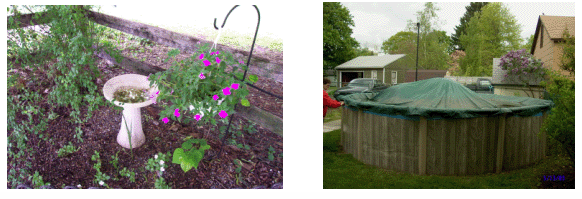
Hand cleaning of larval mosquito habitats is done frequently by the Warren County Mosquito Commission (Commission). Drainage ditches, canals and stormwater facilities often need to have outflows cleaned to remove accumulated debris and sediment. Leaves collect in swales and ditches causing blockages if not removed. It is often necessary to remove silt with hand equipment to keep water flowing. Trees, debris, and beaver dams often block streams and require removal or modification to prevent flooding.
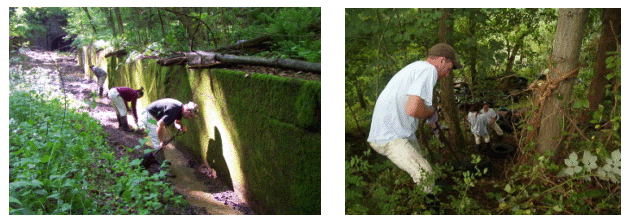 The use of heavy equipment is a major component of the water management program. The Commission is fortunate to lease a low ground pressure excavator on tracks and a wide tracked bulldozer from the NJ State Office of Mosquito Control Coordination. The New Jersey Department of Environmental Protection’s Land Use Regulation Program regulates most water management projects completed by the Commission with heavy equipment through a permit system. Projects completed under a permit in municipalities with notable species, either federal or state, are also approved by the US Fish and Wildlife Service and the NJDEP, Endangered and Nongame Species Program. Wetlands are modified to keep their original natural functions and sustain healthy wildlife characteristics, but reduce the amount of standing surface water to reduce mosquito populations. Ditches and swales are often used in this modification.
The use of heavy equipment is a major component of the water management program. The Commission is fortunate to lease a low ground pressure excavator on tracks and a wide tracked bulldozer from the NJ State Office of Mosquito Control Coordination. The New Jersey Department of Environmental Protection’s Land Use Regulation Program regulates most water management projects completed by the Commission with heavy equipment through a permit system. Projects completed under a permit in municipalities with notable species, either federal or state, are also approved by the US Fish and Wildlife Service and the NJDEP, Endangered and Nongame Species Program. Wetlands are modified to keep their original natural functions and sustain healthy wildlife characteristics, but reduce the amount of standing surface water to reduce mosquito populations. Ditches and swales are often used in this modification.
Maintenance on man-made structures (ditches, swales, etc.) to reduce standing water is the most common project completed by the Commission. It is essential that once a water management project of any sort is completed, it be maintained to remain consistent with its original design purpose.
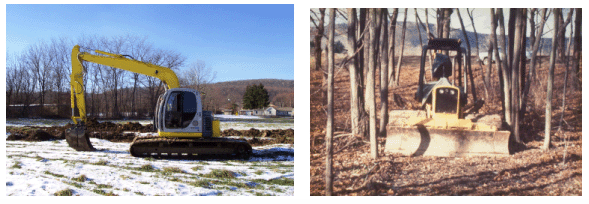
Open Marsh Water Management is not performed on Freshwater Wetlands, but instead on Saltwater Marshes, which do not exist in Warren County . However, this technique is noteworthy because of New Jersey ‘s leadership in dealing with this prolific mosquito habitat in the states coastal areas. A typical salt marsh is scattered with many small pothole depressions. Open Marsh Water Management was developed in the late 1960’s in New Jersey and has since become a standard in the Northeast and Mid-Atlantic states. Small shallow ponds are installed and connected with ditches to eliminate the pothole larval habitats. These newly created areas are suitable for larvivorous fish to access for control of any mosquitoes that develop there.
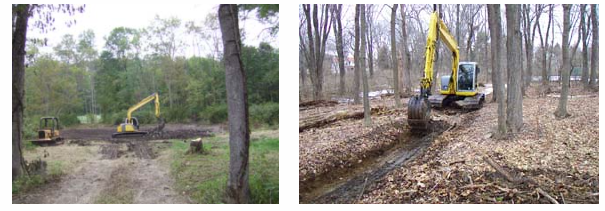
State Funded Tire Collection Program
Through state grants procured by the Pollution Control Financing Authority of Warren County (PCFA) thousands of tires have been taken out of the environment and recycled through collections for homeowners and farmers as well as for road departments within Warren County . The Warren County Mosquito Commission contributed to these tire collections and over the past several years Commission staff has collected over 1800 tires from routinely inspected sites as well as through cooperative ventures. Recycling tires is the best way to eliminate this breeding habitat that can produce millions of mosquitoes.
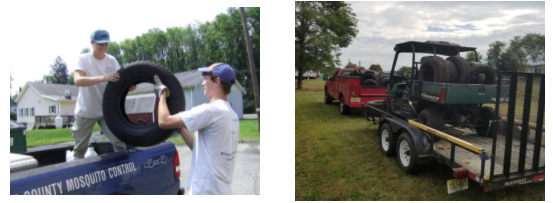 Municipal and County Departments of Public Works are encouraged to recycle tires as often as possible and to participate in free tire recycling events. Residents are encouraged to recycle unused tires (often stored in close proximity to homes) to prevent them from accumulating water and producing mosquitoes, often right in their own backyards. The PCFA now accepts tires for recyling from Warren County residents, small businesses and farmers for a nominal fee. The following link provides more information. PCFA tire recycling program.
Municipal and County Departments of Public Works are encouraged to recycle tires as often as possible and to participate in free tire recycling events. Residents are encouraged to recycle unused tires (often stored in close proximity to homes) to prevent them from accumulating water and producing mosquitoes, often right in their own backyards. The PCFA now accepts tires for recyling from Warren County residents, small businesses and farmers for a nominal fee. The following link provides more information. PCFA tire recycling program.
